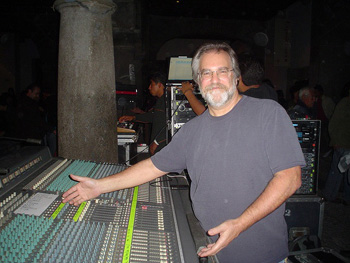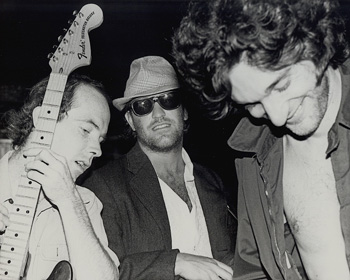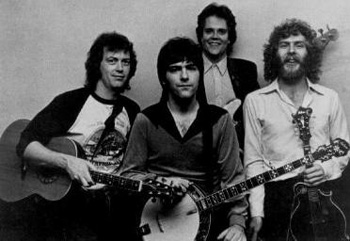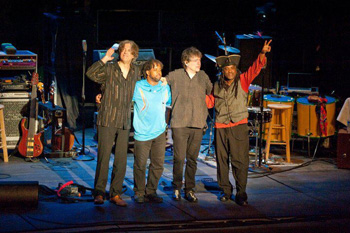"Bela never stops looking for the next thing to be doing… you can’t ask for anything more to keep a life interesting.”
Richard Battaglia
Behind the Scenes: Richard Battaglia, Audio Engineer & Tour Manager for Bela Fleck
An Interview By Mariah Fleming

Richard Battaglia lives a life that most people can’t begin to imagine. He’s on the road for the better part of each year, primarily with Bela Fleck. In between tours with Fleck, he’s touring with other musicians or working on recording projects. He could write quite a book about his work during the last thirty years with some of the world’s most well respected, iconic musicians. He says he thinks about it on occasion. But, the question is, when would be have the time to do it? “Maybe I'm saving it for retirement.” he said. “It would be a huge undertaking. Getting every one’s approval could take forever!”
Battaglia’s road to being an audio engineer for some of the biggest names in music started three decades ago, at the beginning of the 1980’s. First, he worked as an audio engineer and tour manager with New Grass Revival (where a new young standout named Bela Fleck played banjo.) When New Grass Revival disbanded, Battaglia continued to work with Bela Fleck. He was there at the beginning with Bela Fleck and the Flecktones. Fleck keeps most of Battaglia’s calendar filled up. But when he’s not touring with Fleck, he works on many other tours and music projects.
But before all that happened, Battaglia was the bass player in Balboa, a popular band out of Knoxville, Tennessee. So what made him decide to stop performing music and work instead on the technical side of the art? And what’s it like for him to do what he does? During the Arizona leg of Bela Fleck’s tour with the Marcus Roberts Trio, Battaglia sat down with me to talk about his work during last three decades, how it all came about and to share some stories from the road.
Q. Before you took up working behind the scenes full time you were in Balboa, an up and coming band out of Knoxville, Tennessee. Tell me a little about Balboa.
A. The band started in Knoxville, TN, around 1978-79. A great guitar player named Terry Hill was writing songs for a band he was planning. Terry hooked up with another great guitarist, Hector Qirko, and decided to look for a bass player and drummer. I squeaked by the first audition – went home and learned the tunes and came back and got the gig.
Q.Where did Balboa perform?
A. We played in Knoxville area for a few years and then decided to go to NYC to try to make a name. We lived in Jersey and played wherever we could.
Q. I've heard a few cuts from the band’s "Live Like This" recording. It’s hip, inventive, original stuff. Did you have a record contract?
A. No, we didn’t.
Listen to "Writer and the Artist" by Balboa
Q. Why did you give up performing music to work with other musicians?
 A. We were making some headway, but things fell apart and we disbanded. That was the last performing I did. It all ended around 1981. And I always knew I was a so-so bass player. I learned my parts, but I wasn’t the caliber of the musicians I began to deal with. I was a better sound engineer and decided I would do better heading in that direction. Tour managing came as an after thought.
A. We were making some headway, but things fell apart and we disbanded. That was the last performing I did. It all ended around 1981. And I always knew I was a so-so bass player. I learned my parts, but I wasn’t the caliber of the musicians I began to deal with. I was a better sound engineer and decided I would do better heading in that direction. Tour managing came as an after thought.
Q. Do you ever get nostalgic about being in a band and wish you were performing instead of working behind the scenes?
A. Sometimes…I hear song I know I could play and would have fun doing it. I’d love to be in a Pretenders cover band! But I’m very happy being behind the scenes.
Q.Do you ever perform music anymore?
A. No. It’s been really maybe 30 years since I’ve played with folks. I sometimes pick up the bass at home and play for a bit, but not thinking I’d like to take another stab at it!
Q. When did you become interested in the technical side of music and decide to be an Audio Engineer?
A. I had always been interested. After college I was doing both on a regular basis. I worked in a bar in Maryville, TN and played and mixed there a lot. I began meeting national touring musicians. That’s where I met New Grass Revival and eventually was asked to go on the road with them. That thought was exciting and I jumped at it.
Q. In what year did you meet New Grass Revival?
A. In 1976, when they [Sam Bush, John Cowan, Courtney Johnson, Curtis Burch] would come thru and perform at the bar I worked at – the Down Yonder Saloon. But I didn’t actually start working for the band until a year after Bela and Pat Flynn joined the band.
Q. How’d you wind up being asked to work with New Grass Revival?
A. I was the house guy when the band came to town. Kathy Bush, then the wife of Sam Bush, was the engineer. We became friends. When she left her position, she recommended me! That was 1982.
Q. Had you done sound for other bands before working with New Grass Revival?
A. Yes. I had been working at clubs around Knoxville, mixing acts that came thru town. Cash Valley Drifters, Emmylou Harris and the Hot Band, Pat McLaughlin and local blue grass bands.
Q. You worked with Sam Bush, Pat Flynn, John Cowan and Bela Fleck for about nine years in New Grass Revival. What were some of the most memorable concerts you did with them?
 A. Telluride was always the cream of the crop, then Strawberry Bluegrass in Yosemite. Some great clubs were the Birchmere in Alexandria, VA or Ella Guru’s in Knoxville, Tennessee.
A. Telluride was always the cream of the crop, then Strawberry Bluegrass in Yosemite. Some great clubs were the Birchmere in Alexandria, VA or Ella Guru’s in Knoxville, Tennessee.
Q. What’s one of the strangest or most memorable things that happened in your days of touring with New Grass Revival?
A. We played an outdoor festival; I can’t even remember where it was. It was an older hardcore bluegrass crowd and a few of the folks weren’t happy with the band. One old guy actually stood up and held his nose while walking out of the show. Tough crowd!
Q. Did you sign on as New Grass Revival’s Audio Engineer and Tour Manager or did your responsibilities evolve?
A. Both. I had to learn how to do the tour manager thing as I went. Sam was a great teacher and guided me thru the early days!
Q. Why did New Grass Revival decide to disband?
A. For various reasons. One obvious one was that Bela was ready to go out and do his own thing. Sam wasn’t interested in a part time band and decided it was time to give up the whole thing and look after his own career.
Q. Do you have occasion to work with Sam Bush anymore?
A. Yes, I see him a few times a year. I usually have the opportunity to mix the house band at Telluride – Sam Bush, Jerry Douglas, Edgar Meyer, Bela Fleck, Brian Suttone and sometimes Stuart Duncan. Always a great show. Love those guys.
Q. Did you see Bela perform before you worked with him when he was in New Grass Revival?
A. No I didn’t. I kept hearing Sam talk about him, but never saw him play.
Q.When is the first time you met Bela and what was your first impression of him?
A. We were all young back then, but he was even younger, just a kid - and he was great. Played like no one I have ever heard! I was excited to work with him.
Q. Did you see evidence of Bela branching out into music other than bluegrass during his New Grass Revival years?
A. Yes. Bela was always bringing great songs to the band, the kind of music I really liked. Music with smarts (like Balboa was as well). He eventually did a record called “Deviation” with all the guys but it was all his own music. I loved it.
Q.You began working with Bela about a year after New Grass Revival disbanded, is that right?
A. It was really the same time New Grass Revival was breaking up. We did a tour in 1989 to see if it would work, before New Grass Revival actually played the last show. So it took a few months for things to get rolling before Flecktones started touring. I was onboard from the early days. I also mixed the first show at the Lonesome Pine Special that Bela did, and played for the first time with Howard [Levy], Victor [Wooten] and Future Man [Roy Wooten].
Q. What was New Grass Revival’s last show?
A. Opening up for the Grateful Dead on New Years Eve 1989/1990! Great last show!
Q.What was your first collaboration with Bela Fleck?
A. Bela was trying to test out his Banjo Jazz bands and we did a number of shows with a bunch of other musicians. We even traveled to DC to do the Birchmere with the Banjo Jazz Band. It had vibes and percussion in the band.
Q. Bela Fleck and the Flecktones had something out of this world from the start. What was it like to work with them in the beginning?
A. It was very exciting. I loved the tunes. The musicianship was great. Every night was something new and creative. I loved it.
Q.Did you engineer their first album?
A. No. I didn’t get involved for a number of CD’s. Bil VornDick was the engineer of at least the first three CD’s. I really got involved during the making of Live Art. It was the first time Bela started using Pro Tools and I got involved more because of the Mac Computer factor. That was around 1995.
Q. You and Bela have worked together continuously for nearly three decades. What things about Bela personally and musically inspire you to stay with him?
A. Bela is very fair and logical about all his dealings with musicians, people and music. He’s very easy to be around. I love his composition skills. In the end, that was the biggest attraction. His writing was always interesting and kept me involved.
Q.Bela continues to reinvent the way the banjo is used. It must be an amazing journey to see his brilliant work evolve into ever more extraordinary directions. It would seem impossible for the music to ever become boring.
A. For sure. It is what keeps it all interesting. He never stops looking for the next thing to be doing. You can’t ask for anything more to keep a life interesting.
Q. How would you describe Bela in terms of his relationship with his music, his collaborators and his audiences?
A. It is his life. It’s who he is and he will always continue to try to improve himself…never ending!
Q. Bela brought the original Flecktones with Howard Levy back together in 2012 to tour. What were the high points of that tour for you?
 A. Just hearing all the old tunes that were mixed into the set each night would bring me back to the beginning and remind me why I loved it so much from the start. It all felt so natural and still exciting. It was a good year.
A. Just hearing all the old tunes that were mixed into the set each night would bring me back to the beginning and remind me why I loved it so much from the start. It all felt so natural and still exciting. It was a good year.
Q.With the Flecktones over the years, what are some of the most memorable or unexpected things that happened onstage?
A. Well, it might have been the time the band was opening up for Chicago. Victor spun his bass, the strap broke, and his bass slid to the end of the stage. It stopped before falling into a 20-foot pit. He had his straps made out of saddle leather after that!
Q. What else?
A. The many times we had the opportunity to open for the Dave Matthews Band. Dave would bring the whole band back onstage for a jam. It was a great opportunity to play in front of 30,000 folks who were having a great time! Very cool! We were always performing with many great musicians as openers or festival bands. Lots of cool stuff would happen!
Q. You work at so many different kinds of venues here and all over the world. What are some of the most challenging experiences at shows?
A. Just always learning new things, how to do stuff better; learning what other musicians expect while onstage, how to work with unusual folks; always learning, always challenged. Good for an old brain!
Q. Is it much different from a technical point of view to work overseas?
A. For a while, going overseas was like slipping back into the high school / college era of audio. We always had to deal with old, out dated equipment. These days it’s all much better. Everyone has good equipment now – mostly!
Q.What is most memorable about your time touring with Bela?
A. Just all the time we’ve spent together doing what we all wanted to be doing, and being amazed that the audiences as well like what the band was doing…and that they continue to come out and support the band and the music.
Q. You mentioned a US State Department cultural outreach program for which you did some tours. Seems like a wonderful way to create some common ground and cultivate peace through the arts. Can you tell me more about it?
A. Yes. We had a wonderful experience doing a US State Department tour. It was a program to bring American music, theater and dance to countries all over the world. They would bring music to all the locals of countries and present the American style to them. New Grass Revival did two different tours. The Flecktones did one.
Q. How many tours did you do for the State Department?
A. That tour was the last one because Newt Gingrich shut down much of the US spending and this program was part of the cuts. It didn’t stop the tour at the time, but we knew we were on the last tour. This particular trip we went to Mongolia, South Korea, Indonesia, Thailand, the Philippines and Singapore. It was always a great experience for all. The Flecktones were great diplomats.
Q. You did a recording of stunning indigenous music with a band called ALASH from Tuva, located on the southern side of Siberia. They do ‘throat singing’ Can you tell me about them and your project with them?
A. When we traveled to Mongolia we all fell in love with throat singing and began our relationships with the talented folks from Tuva. These guys are apprentices of the great Kongar-ol Ondar. After spending time in Mongolia, we came in contact with Ondar and had him come on some shows. He is presented in the Flecktones DVD called “Live at the Quick.”
Q.They also appear on the Flecktones 2008 CD “Jingle All the Way.” How did that come about?
A. Ondar let us know about the Alash group and the fact that they would be touring around the states about the same time we were recording the “Jingle All the Way” CD. We were recording a holiday CD in July! So we invited them to get involved with a song or two and we all hit it off great. We started having them sit in with the band when they were in the area. Eventually we did two holiday tours with them on every show. It was great fun!
Q. Have you been to Tuva?
A. No I have not been to Tuva yet!
Q. Your main work is touring with Bela. How busy does he keep you?
A. Most of the time, he keeps me busy throughout the year.
Q.How many months in a year are you on the road with Bela?
A. A normal touring year is about 100 to 120 shows a year. That turns into about half a year of traveling away from home.
Q. About how many months per year are you involved doing other tours or projects?
A. It is different from year to year. One year I traveled most of the year as Emmylou’s FOH [Front of House] I’ve gone out for 3-4 months on two different Jazz tours not related to Bela. But most years, he keeps me busy!
Q.You tour with other people like Emmylou Harris when you're not working with Bela. Who are some of the other people you most often work with? Can you elaborate on some of your more recent experiences with other musicians?
A. Lately I’ve been doing a tour with an all-star cast of jazz musicians. It’s called Monterey Jazz Festival on Tour. Christian McBride, Dee Dee Bridgewater, Lewis Nash, Benny Green, Chris Potter and Ambrose Akinmusuire. It’s what I’ve been doing since the beginning of this year. I had a month in India with Bela, with Zakir Hussain and Edgar Meyer. This tour is about to wrap up. It’s been a great experience, these are top-notch players, and it has been great fun.
Q. When you tour with Bela on other projects like Music For Two with Edgar Meyer, or the tour with Bela, Edgar Meyer and Zakir Hussain, in what ways is it different from touring with the Flecktones?
A. Overall it’s not very different. There may be different needs for different musicians, different travel options, but otherwise it’s just a matter of checking the details and making sure it’s all covered.
Q. What projects are you currently working on with Bela?
A. Bela is jumping into the symphony pieces for the next year. He has written a piece for a band called Brooklyn Rider – a string quartet. We will be doing shows with them later in the year. We still have some Marcus Roberts Trio to finish up. There will also be another New York Banjo tour in October.
Q.What is the most challenging aspect in doing what you need to do to make every combination of music sound so perfect?
A. It’s a matter of figuring out what is going on in a given room in respect to what I am hearing. I have to decide what the room sounds like, what the PA sounds like, what the stage sounds like. It’s a matter of figuring out what I am hearing and then figuring out what I have to do to adjust in order to get the sound I want to hear.
Q. Are there houses you play that you don't want to return to because of the acoustics or other issues that pertain to sound quality?
A. There are places I don’t like to work in, but sometimes you have to do it anyway.
Q. Do Bela and you have any control over that?
A. It’s possible to choose places that you don’t want to go back to, as long as there are other options. It’s not at the top of the list of reasons not to go back to a place, but it could be one of them.
Q.What are your biggest challenges as an Audio Engineer?
A. These days it’s using a different digital console from night to night. They are all different and they do the same thing differently. So you have to kind of rest your brain from night to night. Otherwise it’s having the time to check everything to make sure all the connections are working, then figuring out what needs to be done to get it to sound the way you want it to sound.
Q. What are your biggest challenges as the Road Manager?
A. Tour managing is a matter of having a good list of all the things you need to have to make the show day go smoothly and running down that checklist in advance for each performance. Things like addresses, hotels, catering, tech stuff, backline, times, merchandise, directions, etc. if you can keep track of all that in advance, the day goes much smoother.
Q. In addition to Audio Engineering, what else are you responsible for when you're touring with Bela?
A. As tour manager, I deal with all the logistics: travel plans: air flights, tour bus, rental vans and hotel bookings, day schedules, set up departures and arrivals, load in, sound check, meal times and show times. I’m in contact with the promoter, hotel/sales, sound companies, lighting, catering and merchandise folks, ordering merchandise, fixing things or getting them fixed.
Q.What's the most difficult or challenging thing about being on the road?
A. Dealing with people who don’t know how to do their job becomes frustrating. Hotel front desk folks can ruin your day. Otherwise, it’s getting rest. If you are tired, it’s harder to do all the things that need to get done.
Q. What projects are you currently working on?
A. I’m about to work on some time off project. Looks like I’ve got the summer off, unless something really interesting comes along. Otherwise I’m looking forward to spending time at home and getting out on the beautiful lakes we have in Tennessee!
Q. You've traveled all over the world in your work. What's your favorites destination (other than home)?
A. In the states, it’s Telluride, CO overseas it’s Spain. Australia as well, but it takes too damn long to get there!
Q.If you had it to do things over again would you change anything?
A. I’m very content at this point in my life. I can’t say that I would have done anything different. The cosmic path is what it is and I’m glad I have been able to keep up with it!
Contact the author of this article at Editor@MusicAndMoreAZ.com.
